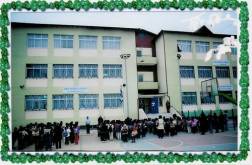(History – Programmes)
|
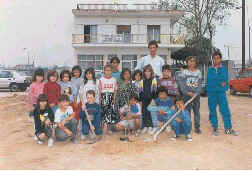
our
first school 1983-1998 |
The
Sixth Primary School of Eleftheria – Kordelio is situated and functions
on the western edge of the town-planning group of Thessaloniki.
The school functioned for the first time during the
school year 1983/84 with six classes. It functioned in a rented and
unsuitable building in poor condition with consequences even in relation
to the safety of the pupils. This situation continued until the school
year 1997/1998 when in May 1998 it was transferred to a new building along
with the 6th infant school and the 3rd secondary
school. As far as the social composition of these pupils is concerned,
many come from under- privileged social groups (refugees, foreigners –
gipsies). |
Social
needs and the fight for survival of the local
community, with its poor economy, leads to the neglect of the children.
During the school year 1998/99 the school was upgraded to a twelve class school
and simultaneously renamed the 6th
Intercultural All-day Primary School.
| It was renamed
‘intercultural’ because during the years 1998/99, 1999/2000, 2000-01,
2002/03, 2003/04, 2006-07
a
programme of intercultural education was put into practice in
co-operation with the Institute of Same Race Education and Intercultural
Education by three bilingual educators teaching children of refugees,
children from the former Soviet Union and children of other nationalities.
Mr. Stavros Dajos graduated from the School of Philosophy at the
University of Tirana and Mrs. Lora Spiranti and Mrs. Foteini Danilidou are
both teachers of Russian philology. |
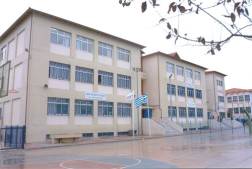
our
new school 1998- |
The
aim of the intercultural programme is not only the
social integration of students and their families with respect in the
difference and in the origin, but
also to make students capable of dealing with the cross-cultural reality and
profit by it, according of course, to
democratic, social perceptions and proceedins.
|
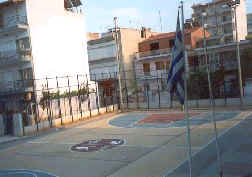
our
school-yard |
In
order to achieve such goals various methods are used:
Educators
are trained and made aware of the situation.
Parents
are given information and made aware of the situation
There
is solidarity of the school towards the neo-refugees, foreigners, gipsies
and their families.
There
is freedom for multicultural expression.
The
support of the creative activities department during the extended hours.
(5 departments).
There is recognition and support of the abilities
and talent of pupils as well as psychological backing. |
With
the application of this programme the results are evident. The neo-refugees and
the Albanian pupils are being integrated rapidly into the normal teaching
process with far fewer problems, ‘relieving’
considerably the class teacher who cannot in the classroom as a whole follow
special programmes for them. There is co-operation with the families. We have
noticed of course that this remarkable progress of the primary school pupils
does not continue into the secondary school. Drop-out rates are very high.
Unfortunately for this school year, 2001/02, the programme has not been in
operation in any of the intercultural schools.
It
again the
school year 2002/03 and 2003/04 with two Teachers (Mrs.
Foteini Danilidou and Mrs.Dajou Merita).
Apart from the
intercultural programme at the school, for the past four years the programme
of the University of Ioannina and of the University of Thessalia, has been in
progress for the education of gipsy children. The attendance rate of
these children at our school is highly consistent and the results are very good.
|
It
is well-known that during the previous years, 28 pilot programmes of All
day lasting Primary Schools functioned and an important number of extended
hours schools ( as ours was in the past ).
The Ministry of Education, making the best out of
the pedagogical conclusions that came up by the 28 pilot programmes, as
much as the experience of organizing schools of extended hours programmes,
went on with the functioning of the all day lasting primary school, which
comes up to the contemporary educational needs. |
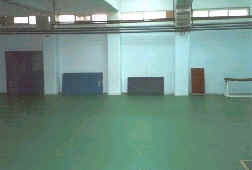
our Gym |
Today
with the functioning of 5500 all day lasting Primary Schools and all day lasting
Kindergartens, the institution has been extended all over the country, from the
urban centres to the most far away and difficult of access places, with the
possibility of service to 200.000 families, where as the classes of extended by
all the students, if they wish to do so, independently of their parents working
or not. The extended hours school has a strong educational and social content.
It was formed to service high pedagogical purposes, such as the pedagogical use
of the children’s time in the afternoon at school, with the full
responsibility and supervising of the teachers.
|
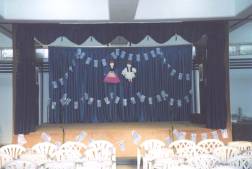
our theatrical-scene
|
Within
the framework of the extended timetable at the school there are five
departments. The programmes which these departments follow
is:
1st hour 12.35-13.15 classes A, B
13.15-13.20
break
2nd hour 13.20-14.00 for
all classes
14.00-14.50
meal-break
3rd hour 14.50-15.30 for all classes
15.30-15.40
break
4th hour 15.40-16.15 for all classes
16.15 -
Departure
|
In
the programme of the All-day school the following
subjects take after 12.35:
Preparation
Supportive teaching in Language, Maths, English and “creative activities”.
By “creative activities” we mean:
Educational games, athletic team games, musical
morement games, pictorial education activities: handicraft or music education,
dance, book study from the library, children’s magazines, showings of video
tapes of educational / entertaining content, theatrical games, teaching of
computer skills in the computer room which was created in the school year
2001/02 at the school.
|
In
the frames of the European Educational Programme
“Socrates-Comenius 1” our school, for the as an
intercultural school, suggested to the I.K.Y. a school plan of co-operation
(for 3 years, starting in September 2003 - 2006) which was approred, along
with the following 5 schools of Europe:
Rigas Herdera Vidusskola (co-ordinating
school in Latvia)
Silvesterschule Erle (associated
school in Germany)
Remigiusschule
Borken ( associated school in Germany)
Szkola Podstawowa
(associated school in Poland)
Atsipopoulou Primary
School (associated
school in Rethymno, Crete)
The
title of our programme is
"The
children write and draw about the children" |
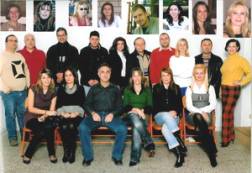
Teachers |
In
the contents of the European
program Socrates-Comenius 2.2.b
which gave us the opportunity since the beginning of the school year 2006-07 to
host the assistant foreign language teacher Mr. Christian
Kollinger from Germany.
We
should also mention that from the school year 2003/04 our school participates in
the “ Flexible Zone “ programme. The
“ Flexible Zone of Inter-subject and Creative Activities “ which consists
part of the weekly programme, lasting for at least 2 hours, with its free
subjective and its active methodology it aims at achieving a double purpose:
First,
to balance the inflexibility, the one-sidedness and the multi-division of school
and second, to develop slowly, with its principles and proceedings, the daily
teaching act.
It must also be mentioned that for the school years
1999/00, 2000/01, 2001/02, 2002/03, 2003/04 and 2004/05 an Olympic Education programme and for
the school year 2006-07 an Kallipatira
Education programme has been carried out by a trained gym instructor.
Home
